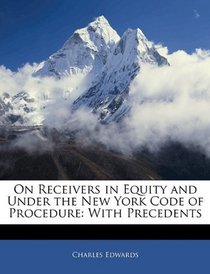Search -
On Receivers in Equity and Under the New York Code of Procedure: With Precedents
On Receivers in Equity and Under the New York Code of Procedure With Precedents
Author:
General Books publication date: 2009 Original publication date: 1857 Original Publisher: John S. Voorhies Subjects: Receivers Notes: This is a black and white OCR reprint of the original. It has no illustrations and there may be typos or missing text. When you buy the General Books edition of this book you get free trial access to Million-B... more »
Author:
General Books publication date: 2009 Original publication date: 1857 Original Publisher: John S. Voorhies Subjects: Receivers Notes: This is a black and white OCR reprint of the original. It has no illustrations and there may be typos or missing text. When you buy the General Books edition of this book you get free trial access to Million-B... more »
ISBN-13: 9781143432590
ISBN-10: 1143432592
Publication Date: 2/3/2010
Pages: 800
Edition: Large type edition
Rating: ?
ISBN-10: 1143432592
Publication Date: 2/3/2010
Pages: 800
Edition: Large type edition
Rating: ?
0 stars, based on 0 rating




